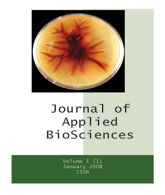Journal of Applied Biosciences (J. Appl. Biosci.) [ISSN 1997 - 5902]
Volume 13: 695 - 699. Published January 5, 2009.
Nutrient enrichment of waste agricultural residues after solid statefermentation using Rhizopus oligosporus
*Belewu M.A. and Babalola F.T.
*Microbial Biotechnology and Dairy Science Laboratory, Department of Animal Production, University of Ilorin, Nigeria.
*Corresponding author e–mail:milkyinka@yahoo.com
ABSTRACT
Objective: To study biodelignification of waste agricultural residues for the purpose of developing novel livestock feeds and feedstuffs.
Methodology and results: Waste agricultural residues of grain crops (maize cob, maize sheath, corn bran, sorghum stover, rice husk ), root crop (cassava waste), leguminous crop (groundnut shell), Mansonia saw dust, Guinea grass and Feather meal were incubated with Rhizopus oligosporus in solid state fermentation,with untreated samples used as the control. Proximate analysis, mineral composition, fibre fractions and the invitro enzymatic digestibility of dry matter were determined and compared. The fungus was able to delignify the waste agricultural residues with significant (P<0.05) reduction in the crude fibre and lignin contents. Protein content of fermented waste agricultural residues increased significantly (P<0.05) above the unfermented samples and protein enrichment was highest with feather meal, followed by rice husk and was lowest for maize sheath. After incubation, maize cob produced a solid residue with a higher in-vitro dry matter enzymatic digestibility than the untreated samples.
Conclusion and application of findings: The study demonstrated that solid state fermentation of some waste agricultural residues with Rhizopus oligosporus can increase the level of limiting nutrients, e.g. proteins and minerals for monogastric and ruminant animals
FULL PAPER [PDF AVAILABLE HERE]
